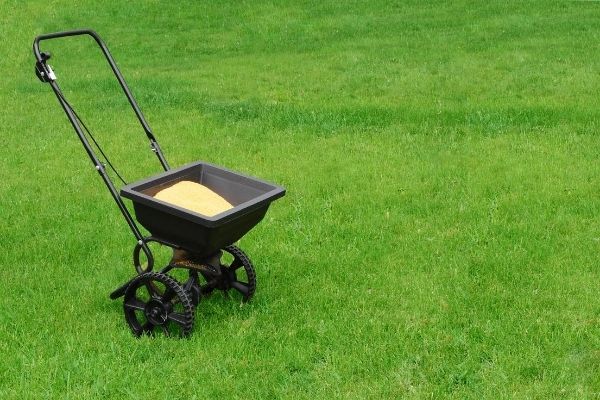Fertilization, Watering, Mowing, and Pest Control are all you need to worry about if you want to keep your lawn up to par. This how-to guide is not for the avid greens-keeper who wants to make every neighbor jealous of their luscious deep-green grass, it is tailored to the homeowner who wants to do the bare minimum lawn maintenance tasks to keep their yard healthy.

Lawn Fertilization
It is often thought that spreading a little fertilizer every year or two is the bare minimum that is needed to keep a healthy lawn. That is far from correct.
Fertilization is only one part of the equation, and every step listed here is needed to maintain a healthy yard. You should fertilize your lawn twice a year to maintain healthy grass. For the warm season grass types we have in Fort Smith and Van Buren, Arkansas fertilizing is normally done during the middle of spring and early summer.
Fertilizing doesn’t just give your grass a deeper green color, it also promotes growth and more densely growing grass blades. Thicker, more dense grass will help prevent problems such as insects and disease. Fertilizing your lawn in the fall should be on everyone’s bare minimum lawn maintenance tasks list.

Watering Your Lawn
It is basic knowledge that humans need 8 glasses of water each day, likewise, your plants and lawn need water to survive.
The rule of thumb for Arkansas grasses is 1 inch of water each week needs to be soaked up by your lawn. If we are in a heavy rain season, you may not need to water your lawn at all. If we are in a drought, you should give your lawn 2 inches of water each week.
The easiest way to tell if your grass has enough water is to walk across it, if the grass where you stepped is still compressed after you move your foot then you need to water more. You should spread your watering cycle out to 2-3 days a week instead of trying to make your lawn take all of the water at once. Make sure your grass is soaking up the water and not causing run-off. After all, water that is draining down the curb isn’t doing your grass any good.
More is NOT better when watering is concerned.
In fact, overwatering is just as bad, if not worse, than not watering at all! Overwatering will cause over saturation of the ground, which will create a spongy effect when walking; it will also make your lawn more prone to disease and infestation.

Mowing The Grass
This lawn care advice is common sense but must not be overlooked. Mowing the grass certainly makes the cut to be on our bare minimum lawn maintenance tasks list.
Riverview Turfworks recommends lawn mowing in the Fort Smith, Arkansas region to be done no less than a weekly basis.
The vast majority of our homes have Bermuda grass and it grows so fast that many people feel the need to mow twice a week! When mowing, set your deck height high, we always cut between 3.5”-4” depending on the time of the year. Taller grass blades will create shade for the grassroots and also help suffocate any weeds trying to germinate in the soil.
Be sure to keep your blades sharp. We sharpen our blades every single day, but homeowners can sharpen their blades every 8-10 cuts.

Lawn Pests, Weeds, and Turf Diseases
That’s right, your lawn can get sick and have problems just like you can.
And much like you, your grass will need a doctor to get it fixed up and healthy again. If you adhere to the previous three steps, then your problems should be somewhat tame.
To help prevent weeds, a pre-emergent should be applied to keep the weeds from germinating. After this window has passed, then often the best course of action is spot-treatment.
Bugs and diseases can be very invasive, sometimes taking over the majority of your lawn. It is often time to call in a professional pest control service to control these pests.
